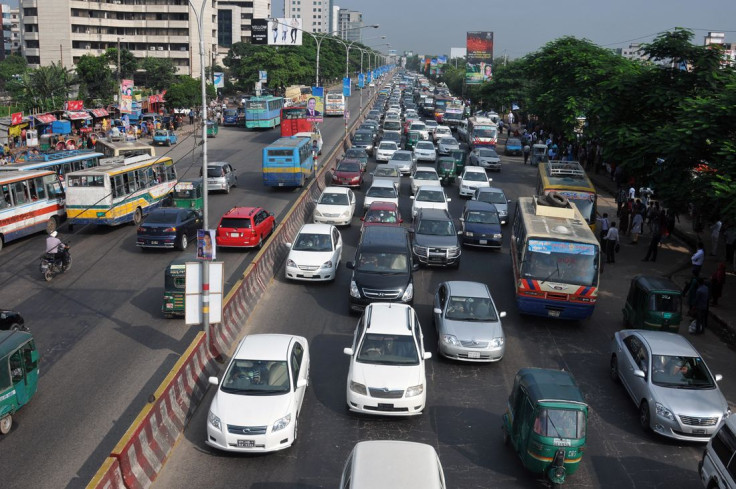Dhaka Metro: Can A New Rail Project Ease Bangladesh’s Traffic Nightmares?

Sheikh Hasina, the Prime Minister of Bangladesh, laid the foundation stone for first metro rail project in the nation’s history that is expected to partially alleviate the extreme traffic congestion in the overcrowded capital city of Dhaka. The ceremony, which took place in Gazipur just outside of Dhaka, formally commences a project that is expected to culminate in a 20.1-kilometer (12-mile) rail line by the year 2022. The metro service will be implemented in three steps -- in the first phase, 11 kilometers will be finished by 2019; another 4.4 kilometers by 2020; and the remaining 4.7 kilometers by 2022.
The Daily Star newspaper of Bangladesh reported that the metro system will stretch from Uttara (north of Dhaka) to Bangladesh Bank at Motijheel (in Dhaka itself). The metro route will feature stations at Pallabi, Chandrima Uddyan, Bijoy Sarani, Shahbagh, Teacher-Student Center at Dhaka University, Bangla Academy, Curzon Hall, Topkhana and Bangladesh Bank.
Earlier this year, the Bangladeshi government signed a loan agreement with the Japan International Cooperation Agency (JICA), an independent entity of the Japanese government, to help finance project. Of the estimated total 220 billion taka ($2.83 billion) cost of the project, JICA will provide about 165 billion taka, with the Bangladeshi state coughing up the remainder. The Daily Star noted that delays and repeated changes in the preparation of the metro project wasted about a year and half of time and pushed up the cost of the endeavor by some $1 billion.
Agence France Presse reported that upon completion the Metro rail is expected to carry 60,000 passengers per hour. Dhaka, a city of some 15 million people, only has about 436 kilometers of four-lane roads and 1,408 kilometers of two-lane roads. As such, traffic in Dhaka is frequently a nightmare -- a government report from 2011 declared that traffic in the city stands still for more than seven hours a day.
Asadullah Khan, a columnist for Daily Star, wrote of Dhaka’s harrowing traffic congestion: “A drive from Kamalapur to Mirpur or Uttara to New Market is a painful experience. The journey from home to office or business centre takes away vital hours from work. Other than being late for office or scheduled appointment, the loss of effective man hours is a colossal drain on the resources of the country.” Khan added that the influx of about 40,000 new vehicles every year and the large increase in the number of rickshaws, many of which are apparently unlicensed, have worsened traffic congestion.
AFP noted that on an average day some 200,000 motor vehicles and another half-million cycle-rickshaws traverse the overburdened roads of the city.
Now there is some scant hope that a metro rail can alleviate some of that transportation misery. "The metro-rail will reduce travel time to 36 minutes [to cross from north to south Dhaka], which now takes hours," JICA’s Bangladesh chief Takao Toda said.
However, the Bangladesh Bridges Authority (BBA), has raised some questions about the metro project, citing, among other things, that the Dhaka Mass Transport Company Ltd., the entity that will be responsible for operating the rail system, is presently dominated by bureaucrats without any technical expertise. Of the eleven members of the Transport Company, there are four bureaucrats, one transportation expert, one chartered accountant and two lawyers. “It remains a serious question as to how such a bureaucratic body will be able to carry out such a huge technical job,” a senior BBA official told the Daily Star. Indeed, JICA, the Japanese financier had requested that all eleven members be qualified and trained engineers.
Nonetheless. the Dhaka Metro project will be Bangladesh’s second largest infrastructure project, behind only a $3-billion plan to construct a bridge over the River Padma. The Bangladesh government said it will finance that project entirely on its own.
© Copyright IBTimes 2024. All rights reserved.





















